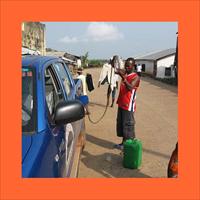UGANDA: Fuel shortage hits aid work in north

Aid workers in northern Uganda could scale down operations if a fuel shortage persists, officials told IRIN.
"Our operations for the past two weeks have been severely affected, we can't get all our staff to work locations because of the fuel shortage," Alex Otim, Gulu district local government secretary for works and rehabilitation, said.
He said the shortage had affected the delivery of aid to hundreds of thousands of internally displaced persons (IDPs) who are trying to rebuild their livelihoods after more than two decades of civil war, led by the rebel Lord's Resistance Army (LRA).
An official from the Norwegian Refugee Council (NRC), who requested anonymity, said the organisation's diesel reserves were running low and they might have to reduce the number of field trips.
NRC helps vulnerable IDPs and also oversees the phasing-out of IDP camps in the region.
"We hope the situation will improve in a few days, otherwise we won't be able to go out into the field," the official said.
Three fuel stations supplying aid agencies in Gulu and Amuru districts have been without petrol for several days and diesel had run out by 28 October.
Kenneth Kitara, the manager of Caltex fuel station in Gulu, attributed the problem to low supplies from their reserves in the capital, Kampala.
"We had been rationing the fuel to only selected international aid agencies but now we have run out," he said.
Fuel prices have also gone up, with a litre of petrol costing USh3,000 (US$1.50), up from Sh2,800 ($1.40) while a litre of diesel now goes for Sh2,800 from Sh2,600 ($1.30).
However, the UN Refugee Agency, UNHCR, is continuing operations as normal and has not been affected by the fuel shortage.
A UNHCR information officer, Moses Odokonyero, said: "We have contracted Caltex as our supplier and our reserves are not sold to any other agencies. Although there is a fuel shortage, we are not yet badly affected as they [Caltex] make sure our supplies are available."
With the fuel shortage beginning to bite, commodity and transport charges have gone up across the region.
Noah Opwonya, an official of Uganda National Chamber of Commerce, said commodity prices would continue rising not only because of the fuel shortage but also because of the global financial crisis.
"We already have a situation of high food prices and this will get worse if nothing is done to address the problem,” he said.
 Back and Next - Back and Next
Back and Next - Back and Next See Also - See Also
See Also - See Also